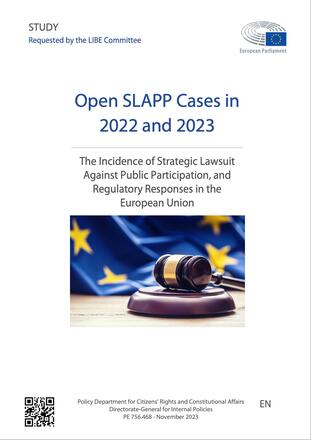
Strategic Lawsuits Against Public Participation (SLAPPs) pose a significant threat to democracy, the rule of law, human rights, and the effective operation of the European Union. Commissioned by the Committee of Civil Liberties, Justice and Home Affairs (LIBE) of the European Parliament, the focus of this research is on legal actions or threats in EU Member States against civil society actors addressing public interest issues.
While the authors acknowledge the limitations of their findings upfront, ( i.e. reliance on databases with distinct methodologies and definitions of SLAPPs and the inability to capture the full scope of the phenomenon due to pre-litigious resolutions sought by claimants), the study provides valuable insights into the current state of the SLAPP phenomenon in the European Union. This includes information on public interest topics triggering SLAPPs, details about claimants and defendants, the cause of action, and the presence of cross-border elements.
Main findings:
- From January 1, 2022, to August 31, 2023, the research identified 47 legal actions involving 102 defendants. Political figures and public officials were the most frequent claimants (42.6%), followed by companies (21.3%), legal professionals (10.7%), and other categories.
- Individual journalists comprised a significant portion of defendants (44.1%), with media outlets and non-governmental organizations also being targeted.
- Italy had the highest number of cases (25.5%), followed by Spain (17%) and Greece (12.8%). The majority of claims were grounded in civil defamation laws (74.5%), with criminal defamation and other criminal offenses making up the remaining cases. Many communications involved multiple public interest matters, spanning issues such as corruption, criminal justice, migration, and international relations.
In conclusion, the authors argue that SLAPPs aim to suppress information on public interest matters, suggesting that the actual number of SLAPPs in Europe exceeds the figures presented in the study. They emphasise the need to consider individual cases against the broader chilling effect SLAPPs have on fundamental freedoms, the proper functioning of the European Union, democracy, the rule of law, and human rights.
Tags: SLAPP Freedom of expression Media freedomThe content of this article can be used according to the terms of Creative Commons: Attribution-NonCommercial 4.0 International (CC BY-NC 4.0) . To do so use the the wording "this article was originally published on the Resource Centre on Media Freedom in Europe" including a direct active link to the original article page.

